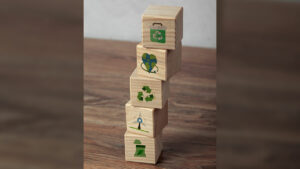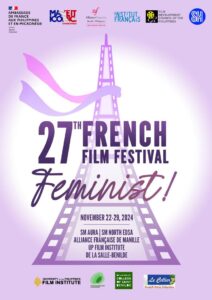
Igniting the ‘Likas-Kaya’ spark
Likas-kaya is the Filipino translation of “sustainability,” defined as a realization that our ability to prosper now and in the future requires increased attention to economic and social progress and to conserving Earth’s life support systems. (Pamela Matson, Pursuing Sustainability: A Guide to the Science and Practice, Princeton University Press, 2016)
“Likas-Kaya para sa Kaunlaran,” on the other hand, is sustainable development, an outcome of sustained sustainability efforts that meet the needs, not only of the current generation, but also of future generations to come.
SUSTAINABILITY LEADERSHIP CERTIFICATE COURSEWhen the De La Salle University (DLSU) School of LifeLong Learning (SOLL) and the Management Association of the Philippines (MAP), through its Committee on Shared Prosperity, organized the Sustainability Leadership Certificate Course held on Aug. 22-23 at the DLSU Andrew L. Tan Data Science Institute in Bonifacio Global City, little did we know that we would be igniting a spark that would drive a broad and deep awareness of sustainability — in all its different dimensions of planetary, human and self-in the Philippine business community.
A total of 29 participants from 22 different companies, including Monde-Nissin, San Miguel Yamamura Packaging, Aboitiz-Lima Land, and other organizations, graced the event.
The Certificate Course covered the following topics based on the sustainability track in my recent fellowship at Stanford University:
1. Sustainability Leadership: A sustainability leader is defined by the University of Cambridge as “someone who inspires and supports actions towards a better world.” Yet, this writer believes that definitions of sustainability in the literature adopt a western lens. For a developing country, sustainability needs to be reframed to have a greater focus on the social, economic, and governance dimensions.
2. Pursuing Sustainability: Pursuing sustainability is no mean feat. Socio-environmental systems, in which opportunities for sustainable development reside, are complex. Such a realization will provide sustainability leaders the multiple levers that will catalyze “inclusive well-being” (its constituents being material needs, health and education, opportunity, community and security). As they say in Filipino, Walang iwanan (No one gets left behind).
3. Planetary Sustainability: This is the conventional space of sustainability and is also referred to as environmental sustainability. It has six dimensions (Bill Barnett, Leading Sustainability by Design, Stanford University, Spring Term, 2023-2024): a. Climate; b. Energy; c. Population; d. Sustenance — Food and Water, Waste, and Plastics; e. Integrated Earth System — Biodiversity and Extinction, and Oceans; and, f. Heritage — Preservation and conservation, indigenous peoples, and conflict and displacement.
4.Human Sustainability: This is about rethinking our role as humans and leaders in this ever-changing world and developing a mindset that creates strong relationships to forge better societies, communities, organizations, and teams. Driving human sustainability involves understanding what drives members of your teams and communities. In addition to mere economics as a motivator, sustainability leaders align individual purpose with collective purpose, ensure mastery through continuing growth and development, and embed autonomy through empowerment and delegation.
5. Self-Sustainability: This is personal and inward sustainability that involves deep reflection on what really matters to each of us, what motivates and inspires us individually and what creates a calm mind, healthy body, and a purposeful life. It involves formulating and implementing strategies to redesign our personal lives in the areas of nutrition, exercise, emotional and mental health, and sleep. In the pursuit of longevity and wellness, this marks a shift from remedial medicine to preventive medicine.
‘LIKAS-KAYA’ LIVE CASESWhile the topics above served as sustainability leadership theories, the certificate course was equally rich in practice with four guest speakers contributing their perspectives.
Pandayan Bookshop Managing Director Gerardo “Jun” V. Cabochan, Jr. shared how human and self-sustainability are embedded as part of the Pandayan DNA through its “Diwa-Kapwa” organizational model. Through Jun’s People First policy, three outcomes are achieved in this model: personal growth, productivity, and progress of every Panday.
Dr. Benito Teehankee, chair of the MAP Shared Prosperity Committee, advocated the MAP- and DLSU-endorsed Covenant for Shared Prosperity that spells out a company’s pledge to do right by its various stakeholders — the employees, customers, suppliers, communities, the environment, and shareholders. This Covenant is in support of the aspiration of the Constitution for “a rising standard of living, and an improved quality of life for all Filipinos.”
Integrating environmental and human sustainability, CleanTech Global Renewables, Inc. President Salvador “Aboy” Castro presented an overview of his company’s renewal energy business alongside CleanTech Foundation’s dedication to building and empowering communities through a host of various social programs.
Focusing on planetary sustainability in supply chain, procurement, and logistics, Charlie Villasenor discussed developing sustainable supply chains and the advantages they bring. He also covered how to build a compelling business case and deal with the corresponding challenges.
‘LIKAS-KAYA’ IN ACTIONA major feature of the Certificate Course is the setting up of a Sustainability Leadership community to be dubbed Philippines “Likas-Kaya” Leaders. This was kickstarted during the two days with each participant identifying their top-of-the-mind sustainability challenge and, working with their course teams, developing sustainability solutions they could bring back to their respective workplaces and contexts.
Post-course, I reflected on the following Sustainability Leadership pathways that every Philippine leader should seriously consider:
1. All of us must view ourselves as “sustainability leaders” with a broad definition of sustainability — economic, social, environmental, governance, etc. It must be embedded in every leader’s role, most specially the CEO.
2. A tri-sectoral leadership mindset and perspective to address “wicked” sustainability challenges needs to be adopted, considering the complex milieus with various institutions and actors at play that may help or hinder a lasting solution.
3. Incorporate frameworks, such as the United Nation’s Sustainability Development Goals (SDGs), the Covenant for Shared Prosperity, and the “Diwa-Kapwa” advocacy, that encourage and inspire organizations to be People First and Spirit-Led in our sustainability actions and efforts.
4. Large-scale and radical sustainability initiatives are marathons, not sprints. Therefore, it is critical that we promote inclusivity by involving all generations and having a multi-disciplinary approach in our approaches and mental models.
5. As with sustainability initiatives and all change efforts, we must be transformational. We may have to be aware and steer clear of the Goldilocks principle — choosing the middle ground always for fear of “rocking the boat” — and always do our best to push strong and hard for positive change. At the same time, we all know that transformation is hard and that is why sometimes, we may have to start with baby steps.
6. It starts in our own backyards — our organizations, our families and homes — these are fertile areas to practice sustainability, whether it be human, self, economic, environmental, social, etc.
Let the “Likas-Kaya” community flourish!
Dr. Ramon “Mon” B. Segismundo is a member of the MAP Shared Prosperity Committee. He is a 2023-2024 fellow of Stanford University Distinguished Careers Institute. He holds a Doctorate in Business Administration from Singapore Management University. He is the CEO of Singapore-based OneHRX.

